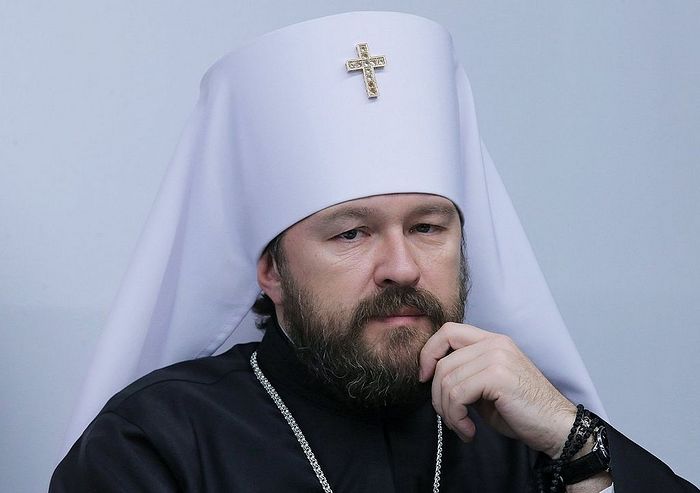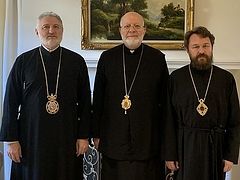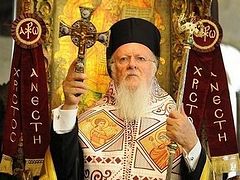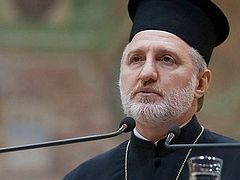Englewood, New Jersey, October 25, 2019
Metropolitan Hilarion (Alfeyev), the Chairman of the Moscow Patriarchate’s Department for External Church Relations, met with Archbishop Elpidophoros of the Patriarchate of Constantinople’s Greek Archdiocese of North America on Wednesday, October 23.
This was the first time hierarchs of the Moscow and Constantinople Patriarchates have met since Constantinople invaded Ukrainian Church territory last year, leading to a break in communion between the two Local Churches. The meeting was held at the invitation of Metropolitan Joseph of the Antiochian Archdiocese of North America at the Antiochian headquarters in Englewood, New Jersey.
Met. Hilarion spoke about the meeting in a short interview with RIA-Novosti yesterday.
The Russian hierarch notes that he first met Abp. Elpidophoros at an Orthodox-Lutheran dialogue in Finland 25 years ago, when Met. Hilarion was a priest and Abp. Elpidophoros a deacon. Since then, “there have been many happy and sad events in our relations and in the relations between our Churches,” Met. Hilarion said, noting that it was especially joyful to participate in Abp. Elpidophoros’ consecration to the episcopate, at his invitation.
The sad events are, of course, associated with the Ukrainian crisis, Met. Hilarion noted.
The two hierarchs exchanged views on what happened between the Russian and Constantinople Churches last year and about what could done in this situation.
Asked if they managed to come to any agreement, Met. Hilarion answered that, “we pray for the preservation of the unity of the Orthodox Church. And we hope that this division will be overcome.”
Asked how the division could be overcome, the DECR Chairman responded that all things are possible with God and that, “In the history of the Church, the Holy Spirit repeatedly instructed its clergy to make the right decisions. I believe it is possible in our time too.”
“Perhaps it is no coincidence that our meeting took place the day after Patriarch Bartholomew announced the canonization of the ever-memorable Elder Sophrony,” Met. Hilarion continued. “I knew this holy man well, an outstanding ascetic of our days, a contemplator of the Divine Light, a disciple and follower of St. Silouan of Mt. Athos.”
“I believe that Fr. Sophrony prays for the Russian Church, so dear to him, which nurtured and educated him, and for the Church of Constantinople, which received him into its bosom twice: first, when he came to Mt. Athos, and then when he found himself in difficult circumstances in England. May the prayers of this saint of God help us to preserve the unity of the holy Churches of God, for which we pray at every Liturgy.”
Of course, the interview has been picked up by and reported on by a number of outlets throughout the Orthodox world. Interestingly, while Romfea simply reproduces the translation in Greek, its English version, Orthodox Times, which enjoys the support of the U.S. State Department, criticizes Met. Hilarion for expressing the hope that the division in the Church will be overcome by the Holy Spirit.
“How can this be achieved when the Patriarchate of Moscow has ceased communion with the Ecumenical Patriarchate and threatens to do the same with the Church of Greece after the recognition of the Ukrainian Autocephaly?” the English editions asks.
“Metropolitan Hilarion shifts the solution of the matter to the Holy Spirit,” the outlet continues.
Similar ideas have been voiced by several notable hierarchs on the Constantinople side of the Ukrainian crisis. In his proposal for overcoming the Ukrainian crisis, Metropolitan Hierotheos (Vlachos) proposes that a council be convoked that will simply endorse a pre-arranged agenda and decision. As Dionysius Redington writes in his response, “Founded Upon Fallacies,” and as Fr. Edward Henderson explains in his interview with OrthoChristian, that is not historically how councils work, and it leaves little to no room for the Holy Spirit to act through the gathered hierarchs.
“If there is no convergence of opinions beforehand on a specific proposal that the Local Churches will accept, particularly the Ecumenical Patriarchate and the Church of Moscow, there is no reason for a Pan-Orthodox Council to take place,” Met. Hierotheos writes.
In his response to the call of Patriarch John of Antioch to convene a pan-Orthodox council to address the Ukrainian crisis, Patriarch Bartholomew responded that, “such a meeting at the Pan-Orthodox level … would be useless inasmuch as it would only lead to agreement that the participants are in disagreement with each other.”




